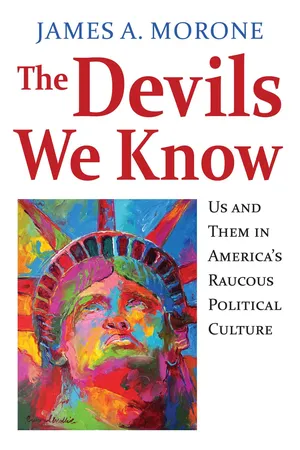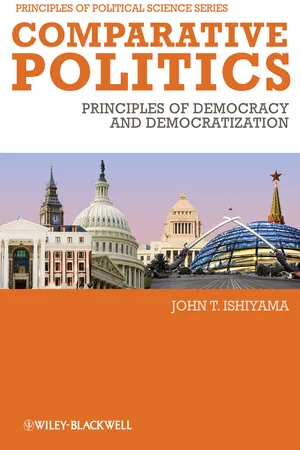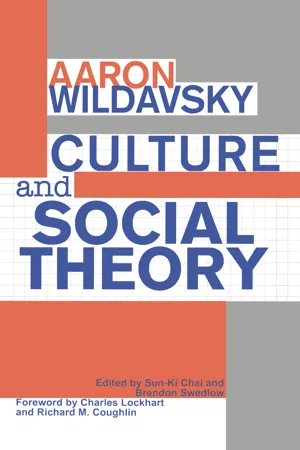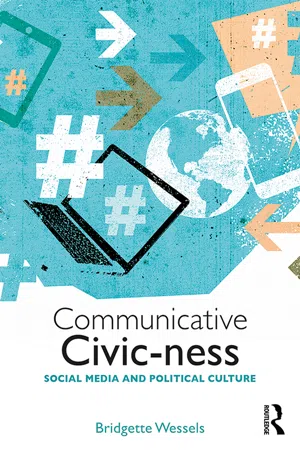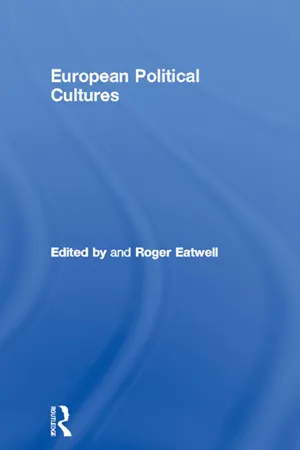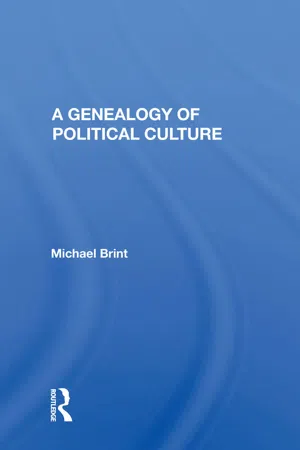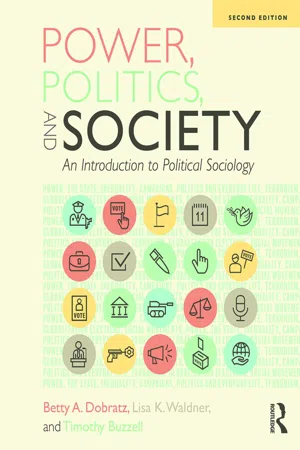Politics & International Relations
American Political Culture
American political culture refers to the shared values, beliefs, and attitudes that shape the political behavior and institutions in the United States. It encompasses principles such as individualism, liberty, equality, and democracy, and influences the way Americans view government, citizenship, and civic engagement. This culture has a significant impact on the country's political processes and policies.
Written by Perlego with AI-assistance
Related key terms
7 Key excerpts on "American Political Culture"
- eBook - ePub
The Devils We Know
Us and Them in America's Raucous Political Culture
- James A. Morone(Author)
- 2015(Publication Date)
- University Press of Kansas(Publisher)
PART IIs There an American Political Culture?Culture is simply the ensemble of stories we tell about ourselves.—Clifford GeertzPassage contains an image 1
Is There an American Political Culture?Culture is elusive. Analyzing it, wrote one historian, is a bit like nailing jelly to a post. But people know it when they see it. Germans talk about a “culture of solidarity”—the basis for a welfare state that is more than a century old. The French profess a faith in egalité and fraternité. Citizens of Thailand participate in elaborate networks of deference and patronage. And at least some Americans celebrate what they see as a heritage of rugged individualism. Every people operate with a culture: shared values, expectations, aspirations, and norms that grow out of history and myth.There are many formal definitions. E. B. Taylor, the founder of social anthropology, put it this way in 1871: “Culture . . . is that complex whole which includes knowledge, belief, art, morals, law, customs, and other capabilities and habits acquired by [people] as member[s] of society.” Margaret Mead boiled all that down to a simple phrase: the “shared, learned behavior of a society.” David Greenstone gave it a more political twist: “the framework of norms, symbols, assumptions, and expectations with which a people make sense of their experiences and formulate appropriate courses of action.” My favorite definition—the one I use—was coined by Clifford Geertz when he was an anthropologist at Princeton University: “Culture is simply the ensemble of stories we tell ourselves about ourselves.”1In the United States, the question of culture has always been entangled in the idea of American exceptionalism—the notion that the United States, uniquely, broke free from the bonds of culture, chance, and history. The Federalist Papers make the point right from the start: “It seems to have been reserved to the people of this country . . . to decide the important question, whether societies of men are really capable or not of establishing good government from reflection and choice.” The established “framework of norms, symbols, assumptions, and expectations,” as Greenstone put it, would not bind this new nation. Americans would found their new regime on reflection and reason.2 - eBook - ePub
Comparative Politics
Principles of Democracy and Democratization
- John T. Ishiyama(Author)
- 2011(Publication Date)
- Wiley-Blackwell(Publisher)
The idea that political culture involved something much more fundamental than attitudes and orientations about particular political systems was particularly appealing to many European scholars, working at about the same time as Elkins and Simeon. These scholars took a much broader view of political culture, rather than attitudes associated with particular kinds of political systems (as had Almond and Verba and Lijphart). David Robertson (1985, p. 263) defines political culture as “the totality of ideas and attitudes towards authority, discipline, governmental responsibilities and entitlements.” Richard Rose (1980, pp. 116–117) thinks of political culture as sets of “values, beliefs and emotions,” that are “taken for granted” by individuals and essentially “give meaning to politics.” Dennis Kavanagh (1985) thinks of political culture in a similar way, arguing that it “disposes its members to regard certain forms of political behaviour and institutions as ‘normal’ and others as ‘abnormal.’ ” Richard Topf (1989) thinks of political culture as comprised of attitudes and stances that people adopt to make sense of politics. Topf proposes that political attitudes are viewed as “expressions of ‘values,’ or better, of positions in the moral order, constitutive of the political culture.” Stephen Welch (1993, p. 34) provides yet another way to think of political culture, not so much as a set of assumptions, but as a set of “resources.” According to this approach, political culture supplies images, symbols, myths, traditions, which enable people to make sense of their situation or predicament which generates certain needs that influence the selection and interpretation of the available cultural resources. Thus, the original notion that political culture was associated with attitudes about particular political systems has increasingly been replaced with the idea that political culture is a set of attitudes and orientations that help people make sense of politics. - eBook - ePub
- Aaron Wildavsky(Author)
- 2018(Publication Date)
- Routledge(Publisher)
Introduction: Political Cultures with Michael Thompson and Richard EllisPolitical culture entered the lexicon of political science in the late 1950s and early 1960s. Intimately linked with the so-called behavioral revolution, the term signalled a move away from the study of formal institutions to the informal behavior which breathed life into them. Political culture was heralded as a concept capable of unifying the discipline. By relating the behavior of individuals to the system of which the individual was a part, it promised to “bridge the ‘micro-macro’ gap in political theory.”1 In recent decades, however, the concept of political culture has fallen out of academic fashion amidst criticisms that it is tautological, that it is unable to explain change, that it ignores power relations, and that its definition is fuzzy.We have no intention of bombarding the reader with the myriad definitions of political culture that have been tried and discarded only to reappear without agreement among scholars. One study counted no less than 164 definitions of the termculture.2Among students of political culture, the most widely accepted definition views culture as composed of values, beliefs, norms and assumptions, that is, mental products.3 This “mental” definition of culture has the virtue of clearly separating the behavior to be explained from the values and beliefs that are doing the explaining. On the other hand, a definition of culture that separates the mental from the social has the unfortunate tendency of encouraging a view of culture as a mysterious and unexplained prime mover.This disembodied view of political culture leads to it being treated as a residual variable, an explanation of last resort dragged in to fill the void when more conventional explanations fail. A recent study appearing in a preeminent political science journal typifies this usage of culture. The authors show that standard demographic variables (income, education, religion, race, age, gender) cannot explain intrastate variation in party and ideological identification, and then attribute this unexplained variance to political culture.4 - eBook - ePub
Communicative Civic-ness
Social Media and Political Culture
- Bridgette Wessels(Author)
- 2018(Publication Date)
- Routledge(Publisher)
There is a great deal of debate about the ways in which it is theorised, including its precise definition, concepts and relationships between concepts. However, political culture is generally understood to mean a ‘set of attitudes, beliefs and sentiments that give order and meaning to a political process and which provide the underlying assumptions and rules that govern behaviour in the political system’ (Darity 2008). In overall terms, political culture seeks to address and include the political ideals of a polity as well as its operating norms. Hence, political culture is seen as both the product of a political system’s history and the histories of the system’s members, and as being rooted in public events and private experiences. Political culture features in the shaping of political communication because it involves values, affinities, conflicts, networks and knowledge, which all frame the practices of communication and types of discussion within the civic realm (Dahlgren 2003). In 1956 Gabriel Almond introduced the idea of political culture, and developed this further in collaboration with Verba in their 1963 book, The Civic Culture. Almond and Verba wanted to examine the ways in which people affect political systems, as well as the ways that political systems affect people. To achieve this, they looked at the idea and role of ‘culture’ in social life, since culture (however that is defined) provides a fabric of social life that is meaningful to individuals. Conversely, social life itself becomes meaningful through people’s interpretations and actions. Thus, in many ways individuals are socialised into their culture, but they also produce and reproduce it. Almond and Verba (1963) argue that culture is a significant influence on shaping social life which can also act as a constraint on it, because of its relative power. Political systems and culture are distinctive from one another and can exist in a variety of different relationships to each other - eBook - ePub
- Roger Eatwell(Author)
- 2002(Publication Date)
- Routledge(Publisher)
1 Introduction
The importance of the political culture approach
Roger EatwellINTRODUCTION
Belief in the importance of studying the values which underpin politics can be traced back in time through a variety of major writers, including de Tocqueville in the nineteenth century (who clearly perceived the importance of individualism and the frontier spirit in American politics), and Aristotle and Plato in Ancient Greece (who wrote about a state of mind which encouraged stability or revolution, and the importance of socialisation in forming adults). It is also interesting to note that the Greeks attributed notably different characteristics to Athenians, Spartans, and Corinthians – as well as to the barbarian ‘Other’ (who encompassed peoples to the north and west, as well as the east).However, the actual term ‘political culture’ was coined in the 1950s by Gabriel Almond, an American political scientist, who argued that ‘Every political system is embedded in a particular pattern of orientations to political action’.1 Together with fellow academic, Sidney Verba, Almond went on in the early 1960s to publish a pioneering five-state (Britain, Italy, Mexico, USA, West Germany) study of such political cultures entitled The Civic Culture, which was based on opinion polls of some 1,000 respondents in each country during 1959.2 Behind Almond and Verba’s resulting collections of percentages was the theory that a stable democracy required a specific set of attitudes, based on a complex balance of ‘subject’ and ‘participant’ cultures, and needed high levels of system support and social trust fostered by overlapping memberships of different groups. Their data indicated that Britain and the USA were the paradigmatic ‘civic cultures’. Among the other social scientists who contributed notable early work in this area was Seymour Martin Lipset, who argued that long-enduring democracies were disproportionately found in the wealthier and more Protestant nations.3 - eBook - ePub
- Michael E Brint(Author)
- 2019(Publication Date)
- Routledge(Publisher)
The Civic Culture. Although research technologies and cultural theories have become much more sophisticated since then, this work remains a classic in the study of political culture.Lucian Pye defined political culture, at its most basic level, as "the set of attitudes, beliefs and sentiments which give order and meaning to a political process and which provide the underlying assumptions and rules that govern behavior in the political system. It encompasses both the political ideas and the operating norms of a polity."16 Operationalizing this definition in The Civic Culture, Almond and Verba distinguished between three different types of orientation:- "cognitive orientation," that is, knowledge of and belief about the political system, its roles and the incumbents of these roles, its inputs, and its outputs;
- "affective orientation," or feelings about the political system, its roles, personnel, and performance
- "evaluational orientation," the judgments and opinions about political objects that typically involve the combination of value standards and criteria with information and feelings.17
Again, what interested these political scientists was the way that specific subjective attitudes and orientations—the beliefs, feelings, and judgments held by individuals—bear upon politically relevant objects.Included among politically relevant objects were members' subjective orientations toward (1) the political system as a whole, (2) the self as political actor, and (3) the component parts of the political system. In turn, these component parts were divided into (1) specific roles or structures (legislative bodies, executives, or bureaucracies), (2) incumbents of roles (monarchs, legislators, or administrators), and (3) particular public policies decisions, or enforcements of decisions. - eBook - ePub
Power, Politics, and Society
An Introduction to Political Sociology
- Betty A Dobratz, Lisa K Waldner, Timothy Buzzell(Authors)
- 2019(Publication Date)
- Routledge(Publisher)
A very similar study of political culture in the United States has looked at how norms about citizenship are changing. Dalton (2016) finds that a significant portion of younger citizens in the millennial generation are motivated to be “engaged citizens” preferring a variety of political acts such as voluntarism, protest, and active political discussions as a way to assert ideas about power. This stands in contrast to what he calls “duty-based citizenship,” which originates out a sense of obedience to the law, civic pride, or a sense of obligation, primarily thought of as voting. Dalton connects these norms that define citizenship to generational shifts, changes in economic and workplace experiences, a more diverse population, shifting gender roles, and education levels. He concludes that… the balance in a democratic political culture often arises from different people following different sets of norms—and articulating the importance of the views of citizenship—and then society and the polity reflect the relative weight of these distinct groups.(180) Social norms change and as a result so does the political culture that shapes the character of how citizens understand politics in society.IDEOLOGY, BELIEFS, AND PUBLIC OPINION
As shared at the beginning of this chapter, ideology is an important element of political culture and this is reflected in the classical theories of politics and power, as well as the contemporary frameworks reviewed in the opening of the analysis. One useful way of thinking about the many approaches to the concept of ideology is by categorizing the vast research on ideology in four ways that highlight the interplay between culture, power, and social action: (1) ideology understood as an ability to comprehend power expressed in the social context, (2) political attitudes and beliefs that make up a constellation or collection of orientations about power, (3) beliefs about issues and politics changed by deliberation or talking about politics, and (4) ideology as a function of historical and social-class influences that conceal or distort to assure power. Each of these research traditions has to date generated a great deal of understanding about the interactions between individual citizens, their political thinking, and structural influences that have effects on the nature of power in society.
Learn about this page
Index pages curate the most relevant extracts from our library of academic textbooks. They’ve been created using an in-house natural language model (NLM), each adding context and meaning to key research topics.
